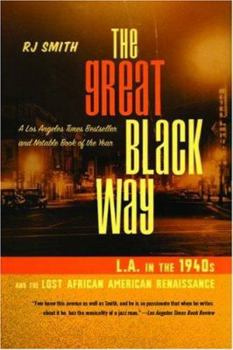The Great Black Way: L.A. in the 1940s and the Lost African-American Renaissance
Select Format
Select Condition 
Book Overview
This book, like a major archaeological dig, unearths a littleknown, now vanished civilization and changes how we understand history. In the 1940s, when FDR opened up the defense industry to black... This description may be from another edition of this product.
Format:Paperback
Language:English
ISBN:1586485210
ISBN13:9781586485214
Release Date:August 2007
Publisher:PublicAffairs
Length:320 Pages
Weight:1.05 lbs.
Dimensions:0.9" x 5.6" x 9.1"
Customer Reviews
4 ratings
School Yourself
Published by Thriftbooks.com User , 16 years ago
What a page turner! In a prose style that bops along like riffs floating out of a Central Avenue nightclub, RJ Smith's book The Great Black Way: L.A. in the 1940s and the Lost African-American Renaissance sheds long overdue light on the history Black Los Angeles. I was prepared to learn more about the fabled music scene on Central Avenue during the 1940's, but there is so much more to this story. The unsubtle ways in which race has shaped life in Los Angeles are fleshed out with sketches of Central Avenue's leading cultural, religious and political leaders; some familiar, others undeservedly obscure. Although the focus is on African-Americans, racist events like the forced internment of Japanese Americans and the Zoot Suit Riots intersected life on Central Avenue and readers will gain a nuanced vision of what this fabled multicultural city looked like sixty years ago (not a pretty picture at all.) The standard narrative of the civil rights movement tends to locate all the action in the south, but LA's home grown struggles to end segregation in the wartime defense industry and post war housing boom deserve a place in schools' curriculums and popular culture. And for anyone interested in the survival strategy known as "passing", or for anyone with more than a "passing" interest in the musical/cultural genre known as "exotica", the chapter on Korla Pandit is a must! Thanks RJ, for one of the best books I've ever read on the city we call home. As a postscript I'd like to add that a great book to fill out the "overlooked history" niche of your library is Whitewashed Adobe: The Rise and Los Angeles and the Remaking of its Mexican Past by William Deverell.
A deliteful read...
Published by Thriftbooks.com User , 18 years ago
The ghosts and shadows, spirits and voices long since quieted are awakened, resurrected and put on display for all to see. This is quite simply an excellent book. What the author captures is the pride and determination, intelligence and ignorance, the creative genius and social failures of a street which became an area and an area which became a neighborhood and a neighborhood and its cultures. Cultures and counter-cultures, the civic minded hustlers, businnessmen, club owners, jazz musicians, lawyers, spiritualists, con-men, pimps and whores, atheletes and common folk. Those who endured racial taunts only to serve up taunts of their own, thumbing their nose at society while making plans to kick down the door of barriers constructed to keep them in their place. The sights and sounds of black Los Angeles, the birth place of attitudes which prevail to this day. Rarely has the spirit of urban Los Angeles been captured so completely. The recollections gathered from old newspapers, cards, letters and the fading memories of those still around leave the reader enraptured. Every page is a treat. The fantastic stories coupled with the brilliant personalities make this an enjoyable historic voyage. To understand the roots is to understand the fruit and the subject of this book is definately a root to be studied and enjoyed by all with an interest in urban Los Angeles.
At Last!
Published by Thriftbooks.com User , 18 years ago
The history of our Los Angeles African-American roots have finally been given long overdue mention. With all the attention paid to Harlem, you'd think L.A.'s contributions to black American culture, civil rights, and religion pales in comparision. Hardly true! Azusa Street, was literally the birthplace of the modern Pentocostal movement. And with certain recent documentaries on Jazz, it seemed no one had ever heard of Central Avenue's Club Alabam, or the hot and swingin' Bronzeville district of Downtown. There was the still standing Dunbar Hotel, a black oasis for many of the well known, and not so famous, to find shelter while visiting the "City of Angels." Not to mention black L.A.'s major contributions to standup comedy, and as much as anyplace else, the jumpstart for R & B music. Checkout the early civil rights movement here that foreshadowed such major figures as Martin Luther King Jr. and Rosa Parks, or the black literary community of Los Angeles. A powerful reminder of the huge and highly forgotten contributions of the black Los Angeles community, to the African-American struggles in America. R.J. Smith should receive an honorary medal of human brotherhood.
A Fantastic Journey into L.A.'s Past
Published by Thriftbooks.com User , 18 years ago
If you love Los Angeles and L.A. history, this book is a fantastic read. It both honors the African-American community's struggles for justice and respect in the city and introduces the reader to an extraordinary range of people-artists, journalists, civil rights leaders- who were indispendable to the development of black life and culture in Los Angeles. Mr. Smith also does a superb job in communicating a sense of place and time, namely the sights and sounds of L.A.'s African-American neighborhoods in the 1940s. No matter what your color or background, if you live in L.A.'s city's limits, reading this book wil make you proud to be an Angelino.





